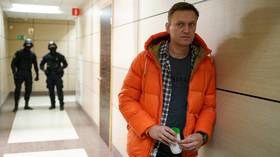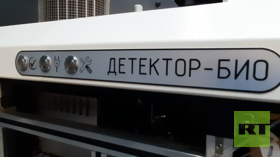Alleged poisoning of activist Navalny could be classed as ‘a use of chemical weapons’ & violation of international law – OPCW

In response to Germany's insistence that Alexey Navalny was poisoned with a Novichok-like nerve agent, the primary international watchdog has warned that such a “reprehensible” act would be considered “a use of chemical weapons”
The International Organization for the Prohibition of Chemical Weapons (OPCW) also labelled it "a violation of international law." The strong reaction came in a statement on Thursday, referring to allegations that the Russian opposition figure’s illness – which began on August 20 – was caused by the use of a nerve agent.
OPCW President Fernando Arias, expressed “grave concerns” over the news.
If the Russian anti-corruption activist was indeed affected by a “Novichok-type substance,” it would violate the Chemical Weapons Convention, according to Arias. Moreover, “any poisoning of an individual through the use of a nerve agent is considered a use of chemical weapons,” he said.
Also on rt.com Novichok-like chemical agent used to poison Russian opposition figure Navalny, German government claims“Under any circumstances” such an act would be “reprehensible,” the official wrote, and would be “wholly contrary to the legal norms established by the international community.”
Arias promised that the OPCW will continue to “monitor the situation” and that it “stands ready to engage with and to assist” any party that may require it.
Moscow has denied any involvement. Kremlin spokesperson Dmitry Peskov said that nobody in Russia would actually gain anything from poisoning the opposition figure.
Foreign Minister Sergey Lavrov added that “the Russian leadership clearly does not” benefit from the Navalny incident, pointing out the “suspicious haste” with which Moscow has been accused.
Also on rt.com West rushes to accuse Moscow of ‘Novichok-type’ poisoning of Navalny… but would Russia really have reason to get rid of him?Think your friends would be interested? Share this story!














